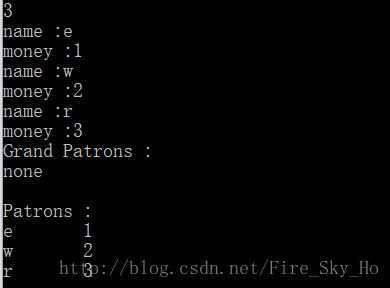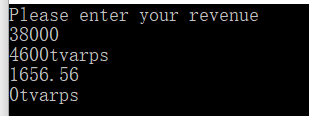C ++ Primer Plus 第六版 第六章编程练习答案
1. 编写一个程序,读取键盘输入,直到遇到@符号为止,并回显输入(数字除外),同时将大写字符转换为小写,将小写字符转换为大写(别忘了cctype函数系列)。
#include
#include
void main()
{
using namespace std;
char ch;
while((ch=cin.get())&&ch!='@')
{
if(isdigit(ch))
continue;
if(isupper(ch))
cout< 
2. 编写一个程序,最多将10个donation值读入到一个double数组中(如果您愿意,也可以使用模板类array)。程序遇到非数字输入时将结束输入,并报告这些数字的平均值以及数组中有多少个数字大于平均值。
#include
void main()
{
using namespace std;
double donation[10];
int i=0,j,temp,count;
double sum;
while(i<10 && (cin>>temp))
{
donation[i]=temp;
i++;
}
for(j=0,sum=0;jsum)
count++;
cout<<"Average is "< 
3. 编写一个菜单驱动程序的雏形。该程序显示一个提供4个选项的菜单——每个选项用一个字母标记。如果用户使用有效选项之外的字母进行响应,程序将提示用户输入一个有效的字母,直到用户这样做为止。然后,该程序使用一条switch语句,根据用户的选择执行一个简单操作。该程序的运行情况如下:
#include
void main()
{
using namespace std;
char letter;
cout << "Please enter one of the following choise:"<>letter;
while(letter!='c'&&letter!='p'&&letter!='t'&&letter!='g')
{
cout << "please enter a c , p , t or g: ";
cin>>letter;
}
switch(letter)
{
case 'c':cout<<"carnivore";break;
case 'p':cout<<"pianist";break;
case 't':cout<<"A maple is a tree.";break;
case 'g':cout<<"tree";break;
}
cout< 5. 在Neutronia王国,货币单位是tvarp,收入所得税的计算方式如下:
5000 tvarps”:不收税
5001~15000 tvarps:10%
15001~35000 tvarps:15%
35000以上: 20%
例如,收入为38000 tvarps时,所得税为5000*0.00 + 10000*0.10+20000*0.15+3000*0.20,即4600tvarps。请编写一个程序,使用循环来要求用户输入收入,并报告所得税。当用户输入负数或非数字时,循环将结束。
#include
int main()
{
using namespace std;
double revenue;
cout<<"Please enter your revenue"<> revenue )
{
if ( revenue < 0.0 ) break;
if ( revenue <= 5000.0 )
cout << "0" << "tvarps"<= 5001.0 && revenue <= 15000.0 )
cout << (( revenue - 5000.0 ) * 0.1 )<<"tvarps"<< endl;
else if ( revenue >= 15001.0 && revenue <= 35000.0 )
cout << (10000.0 * 0.1 + ( revenue - 15000.0 ) * 0.15) << "tvarps"< 35000 )
cout << (10000.0 * 0.1 + 20000.0 * 0.15 + ( revenue - 35000.0 ) * 0.2) <<"tvarps"<< endl;
}
return 0;
}
6. 编写一个程序,记录捐助给“维护合法权利团体”的资金。该程序要求用户输入捐献者数目,然后要求用户输入每一个捐献者的姓名和款项。这些信息被储存在一个动态分配的结构数组中。每个结构有两个成员:用来储存姓名的字符数组(或string对象)和用来存储款项的double成员。读取所有的数据后,程序将显示所有捐款超过10000的捐款者的姓名及其捐款数额。该列表前应包含一个标题,指出下面的捐款者是重要捐款人(Grand Patrons)。然后,程序将列出其他的捐款者,该列表要以Patrons开头。如果某种类别没有捐款者,则程序将打印单词"none"。该程序只显示这两种类别,而不进行排序。
#include
#include
using namespace std;
struct donation
{
string name;
double money;
};
int main()
{
int num;
cin >> num;
donation *don = new donation[num];
int i, count = 0;
for ( i = 0; i < num; i++ )
{
cout << "name :";
cin >> don[i].name ;
cout << "money :";
cin >> don[i].money;
}
cout << "Grand Patrons :" << endl;
for ( i = 0; i < num; i++ )
{
if ( don[i].money > 10000 )
{
cout << don[i].name << '\t' << don[i].money << endl;
count++;
}
}
if ( count == 0 )
cout << "none\n\n";
cout << "Patrons :" << endl;
count = 0;
for ( i = 0; i < num; i++ )
{
if ( don[i].money <= 10000 )
{
cout << don[i].name << '\t' << don[i].money << endl;
count++;
}
}
if ( count == 0 )
cout << "none\n\n";
return 0; delete []don;
}

7. 编写一个程序,它每次读取一个单词,直到用户只输入q。然后,该程序指出有多少个单词以元音打头,有多少个单词以辅音打头,还有多少个单词不属于这两类。为此,方法之一是,使用isalpha()来区分以字母和其他字符打头的单词,然后对于通过了isalpha()测试的单词,使用if 或switch语句来确定哪些以元音打头。该程序的运行情况如下:
Enter words (q to quit):
The 12 awesome oxen ambled
quietly across 15 meters of lawn. q
5 words beginning with vowels
4 words beginning with consonants
2 others
whitehack写的,摘抄在这里,有些换行错了,少了头文件,都改了过来,我自己写的已经不行了,写了一下午,最后啥都没写出来
#include
#include
#include
using namespace std;
int main()
{
int YuanYin=0;
int FuYin=0;
int Others=0;
char str[80]; //还是不会怎么用 STRING...........
bool end=false; //..放一个BOOL变量控制循环...
cout <<"Enter words (q to exit):\n";
while (cin>>str && false == end ) //
{
// cout <0)
{
switch (str[0])
{
case 'a':
case 'o':
case 'e':
case 'i':
case 'u':
case 'A':
case 'O':
case 'E':
case 'I':
case 'U':
++YuanYin;
break;
case 'q':
if (strlen(str)==1)
{
end=true; //读取到单独的Q
break;
}
default:
++FuYin;
}
if (end)
break; //读取到 单独的 Q 跳出循环
continue; //否着继续下一次循环
}
++Others; //非字母
}
cout << YuanYin <<" words beginning with vowel\n";
cout < 好了,休息了一天参照了下上面大佬的和别人的,写出来了
if版本:
#include
#include
#include
#include
int main()
{
using namespace std;
string word;
int c1 = 0, c2 = 0, c3 = 0;
while ( cin >> word && word != "q" )
{
if ( isalpha ( word[0] ) )
{
if ( isupper ( 0 ) )
word[0] = char ( tolower ( word[0] ) );
if ( word[0] == 'a' || word[0] == 'e' || word[0] == 'i' || word[0] == 'o' || word[0] == 'u' )
c1++;
else
c2++;
}
else c3++;
}
cout << c1 << " words beginning with vowel\n";
cout << c2 << " words beginning with consonants\n";
cout << c3 << " others";
return 0;
}
switch版本:
#include
#include
#include
#include
int main()
{
using namespace std;
string word;
int c1 = 0, c2 = 0, c3 = 0;
while ( cin >> word && word != "q" )
{
if ( isalpha ( word[0] ) )
{
if ( isupper ( word[0] ) )
word[0] = char ( tolower ( word[0] ) );
switch ( word[0] )
{
case 'a':
case 'e':
case 'i':
case 'o':
case 'u':
c1++;
break;
default:
c2++;
break;
}
}
else c3++;
}
cout << c1 << " words beginning with vowel\n";
cout << c2 << " words beginning with consonants\n";
cout << c3 << " others";
return 0;
} 8. 编写一个程序,它打开一个文本文件,逐个字符地读取该文件,直到到达文件末尾,然后指出该文件中包含多少个字符。
#include
#include
#include
int main()
{
using namespace std;
ifstream infile ( "C:\\Users\\Administrator\\Desktop\\file.txt", ios::in );
if ( !infile )
{
cout << "Failed to open the file" << endl;
exit ( EXIT_FAILURE );
}
int n = 0;
char read;
while ( !infile.eof() )
{
infile >> read;
n++;
}
cout << "This file has " << n << " characters" << endl;
return 0;
}



